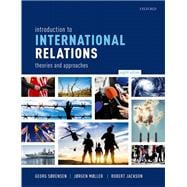Offering unrivalled coverage of classical theories, contemporary approaches, and current issues, together with an exceptionally clear writing style, Introduction to International Relations provides a uniquely accessible and engaging introduction to the subject. With an emphasis on theoretical approaches and their application to the real world, the authors encourage critical engagement with the theories presented, highlighting their strengths, weaknesses, and the major points of contention.
The eighth edition has been thoroughly updated to incorporate current events and key developments in the discipline. The changes include a new, three-part structure, which helps students to build a clear understanding of how key debates in the discipline are connected with each other, and how these can be applied to the world around them. The first part, 'Studying IR', emphasises the practical reality of international relations in everyday life, and how to connect this reality with the academic study of the subject. The second part, 'Major IR Theories and Approaches', guides the reader through the essential theories in the field, including Realism, Liberalism, Social Constructivism, Postcolonialism, and Feminism, among others. Finally, the third part, 'Theory Meets the Real World: Policy and Issues', builds on this foundation by exploring how we can understand current issues such as climate change and terrorism through the lens of IR theory.
A new final chapter, 'The Big Question: World Order or World Chaos?', concludes the text by tracing the development of, and theoretical debates around, the concept of 'world order', providing students with a nuanced and compelling analysis of the key challenges confronting the contemporary world. Opening with an overview of the concept, the authors go on to examine the consequences of the rise of China and the resurgence of Russian influence, the new issues facing established democracies and parts of the Global South, as well as international institutions and their ability to provide global governance. The chapter ends with a discussion that answers the question posed at the start: are we witnessing world order or world chaos?
Digital formats and resources
In addition to helpful learning features within the book, the text is accompanied by online resources designed to help students to take their learning further. These include:
For students:
- Reinforce your understanding of each chapter's key themes with short case studies
- Test your understanding and revise for exams with review questions
- Explore different theoretical debates through a series of annotated web links to reliable content
- Test your knowledge of key terminology using the flashcard glossary
- Extend your learning with videos exploring key issues in IR
For registered lecturers:
- Encourage debate and critical thinking in class with seminar resources
- Download figures from the text for use in your own teaching materials








